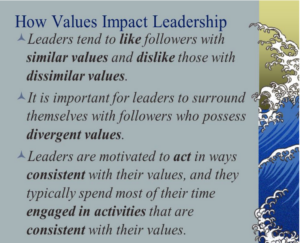Leading with Values
“Living into our values means that we do more than profess our values, we practice them.” – Brene Brown
When you lead – as a manager, executive, parent or coach – do you see your values aligning with your personal and professional goals?
Robert K. Greenleaf, servant leadership scholar and thought leader once said this: “The great leader is seen as a servant first.”
In our January Servant Leadership Community of Practice, Christa Williams (our Executive Director & Learning Facilitator) explored how your values can be the door through which you lead.
Personal leadership reflection
Cargo
by Greg Kimura
You enter life a ship laden with meaning, purpose and gifts
sent to be delivered to a hungry world.
And as much as the world needs your cargo,
you need to give it away.
Everything depends on this…Read the full poem here.
What “cargo” are you leading with in 2024?
What is a value?
Before we talk about leading with values, how do we define it?
A value is a roadmap which guides your actions and is different from a need or a want. A value guides your behavior based on what is important to you. Values are core beliefs – the underlying thoughts that stimulate human behavior.
 Values are innate to humans; some are instilled by our cultures, and others are developed based on our own thoughts and personal experiences.
Values are innate to humans; some are instilled by our cultures, and others are developed based on our own thoughts and personal experiences.
Babies are born with values like compassion, empathy, and the beginnings of a sense of fairness. As we grow up, our nurturing, lived experiences, and societal influence, starts to shape or impact our personal values.
Over time you may lose a sense of your innate values or decide to shed cultural and personal values to pick up new ones. Your values can also stagnate or become corrupted.
These factors make it critically important to take the time to become aware of your life values, evaluate them, and try to place focus and importance on the ones that can help you achieve your goals.
Greenleaf’s discussion of values
Robert K. Greenleaf didn’t specifically use the word “value” in his essay, “The Servant as Leader,” but did describe these core beliefs that align with serving:
- Empathy
- Vision
- Community
- Withdrawal (reflection)
- Accepting others
It’s our strong belief that leaders of all types of institutions, organizations, and sectors can be even more successful with a focus on helping people to know themselves, grow and “be who they ought to be.”
Finding your core values
It’s true that personal values and value systems result in characteristics or attitudes that in turn affect behavior.
- Values affect leaders’ perceptions of situations.
- Leaders’ values affect the solutions they generate regarding problems.
Given this reality, let’s explore a number of values-based exercises and concepts that can help you:
- Define your own values.
- Own values-based leadership to create a more fulfilling work life.
Using Brene Brown’s list of values as a guide, download our Values Worksheet to explore your top 5 values.
- Review the list of values.
- Circle the values that are important to you on page 1.
- Write your own if the list does not include a value that is important to you.
- Continue narrowing down your values list until you get to your top 5.
- After you select your top 5, write a succinct definition of what that value means to you on page 2.
- Then for each value, write “how” you demonstrate that value & include what you expect of others because of this value.
“It’s not hard to make decisions when you know what your values are.” – Roy Disney
After you finish the exercise, ask yourself the following questions:
- What do we learn about leadership from knowing our own values and appreciating the values of others?
- How do people feel when their values are aligned?
- How do people feel when their values are not aligned?
Howard Behar, author of It’s Not About the Coffee, wrote:
“Have you ever minimized one of your personal values…to fit in? Have you ever found yourself believing more in what you ‘thought’ you needed to be and do, rather than have confidence and trust ‘that still small voice?’ Have you ever focused more on the outcome than ‘how’ you would attain the outcome?”
Your values affect your leadership!
How values impact leadership
People don’t have just one core value; they have a whole set of values with varying degrees of importance. As noted, these values affect how they act, react, and interact with their environments.
For example, if an employee becomes upset when a customer is rude to her, that employee probably values respect. If your boss gives you a raise because you always get your work done by the deadlines, your boss may value responsibility. If you feel frustrated and angry because a colleague lied to you, you may value honesty.

When leaders act in positive ways that are consistent with their values it can create a healthy organization.
In your own leadership role, think of ways you can unite around values within your sphere of influence!
We recommend using this exercise, Values for Teams from Brene Brown as a way for executive teams, culture/HR/talent teams, and managers to get clear on the specific behaviors that are expected, encouraged, and rewarded within their culture.
It’s clear that when organizations and companies have operationalized their values into behaviors, those values and behaviors become their culture.
And when servant leaders use their values to create healthy cultures in organizations, think of the possibilities that can create for our future workplaces!
______________________________________________________________________
What have you learned from this blog? Contact us and let us know!
Don’t miss your opportunity to join our next conversation! Community of Practice sessions are amazing opportunities for any and all leaders to gather and learn from one another in a supportive, comfortable environment, right from your computer. February’s topic is “Leading Using Reflective Practices.”
Additional Resources:
- Essay: “The Servant as Leader” – Robert K. Greenleaf
- Book: Dare to Lead – Brene Brown
- Book: It’s Not About the Coffee – Howard Behar
______________________________________________________________________
This blog post wraps up January 2024’s Community of Practice event. To join us during the live discussion for future months, register at https://www.sophiapartners.org/events/. Community of Practice occurs the fourth Tuesday of each month from 11:30 a.m.-12:30 p.m. CT via Zoom.



